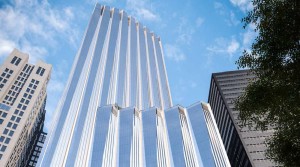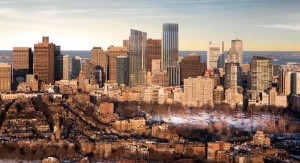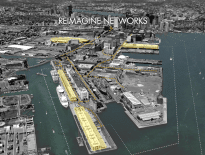A 775-foot-tall office and luxury residential tower on Boston’s Winthrop Square garage site would offer the “optimum collection of benefits” to the city, developer Millennium Partners contends as it awaits guidance from regulators on the final designs.
City councilor and mayoral candidate Tito Jackson is the latest high-profile opponent of a tower of that height, joining neighborhood and parks advocates who are crying foul about a proposed exemption to state laws limiting new shadow on Boston Common and the Public Garden.
The Boston Planning and Development Agency sought designs for a 725-foot-tall tower on the 1-acre site at 115 Federal St. in its request for proposals issued last year, as it proceeds with redevelopment of the condemned municipal garage property. The agency has indicated it wants to move quickly on the project while the market for commercial and residential space remains robust.
Joseph Larkin, a principal at Millennium Partners, said the developers later decided to increase the proposed height to 750 and 775 feet, although he conceded that the figure is not etched in stone.
“The final height is not finally determined exactly,” Larkin told Banker & Tradesman. “We’re just leaving ourselves the option to study the maximum impacts of the project.”
The additional floors would maximize the potential revenues to the city of Boston, which would receive up to $152.7 million in proceeds from Millennium. Along with a $102 million up-front payment, Millennium would pay the city up to an additional $50.7 million based upon an assumption of 507,000 square feet of condominiums sold at $1,000 per square foot.
“If the building gets bigger, then that payment gets bigger,” Larkin said.
That payment, according to a proposal backed by Boston Mayor Martin Walsh, would be earmarked for affordable housing and improvements to city parks, under a home rule petition which requires city council approval to proceed to the Legislature.
The incentive is a trade-off for making a one-time exception for Millennium to the early 1990s laws that limit shadows from new development on the two parks.
Larkin declined to give a minimum height beyond which the project would no longer be financially feasible. But any building taller than 365 feet on the Federal Street property would require an exception from the shadow laws, he said.

Supporters of Millennium Partners’ proposed 775-foot-tall Winthrop Square tower say the project would help Boston compete with larger cities for corporations looking for a signature office building and bring new vitality to the Financial District.
Walsh has not submitted a formal petition to the council yet, and the level of support is unclear so far.
Along with Jackson’s opposition, city councilor Josh Zakim has requested Millennium offer a scaled-down alternative to its “all-or-nothing” proposal, according to a letter sent Jan. 19 to the BPDA. In an email, Councilor Annissa Essaibi-George responded that she has “significant concerns that we are considering changing State Law for one project.” Two other councilors responding to inquiries from Banker & Tradesman, Tim McCarthy and Andrea Campbell, said they are undecided.
In a guest column published in the Boston Sun, Jackson blasted the BPDA for “blatantly disregarding both environmental protections and public safety requirements, for the enrichment of the developers. The BPDA must not violate state law and diminish our public parks to enhance Millennium’s profit. Developers can’t purchase new sunshine somewhere else.”
An Unprecedented Step Forward
While the debate moves forward at the local and potentially state level, Millennium plans to proceed by filing a formal proposal this spring, Larkin said. It’s awaiting a scoping determination from the BPDA before finalizing its formal submission under the Article 80 large project review.
The scoping determination spells out the specific impacts, such as traffic and public realm improvements, to be covered in the submission.
Filing a formal proposal that doesn’t conform with the shadow laws would be unprecedented, said Liz Vizza, executive director of the Friends of the Public Garden.
“This is the first time that this has ever happened and it’s unfortunate the city moved forward with this fast-track process with the laws that are on the books,” Vizza said. “We have a set of rules that developers have to live with. What we’ve seen is we’ve had robust development over the past 25 years, while protecting these two parks which are the souls of the city.”
In public comment letters submitted to the BPDA, supporters said the project would generate economic activity and reinvigorate a corner of the Financial District that empties out after business hours.
Adam Brinch, a partner at CBRE/New England, wrote that Boston lacks a “world-class” office tower that would enable it to compete with cities such as San Francisco and New York for the next big “free agent” corporation. And Millennium’s plans for a 3-story “Great Hall” with shops and restaurants would increase safety and vibrancy in the neighborhood, Brinch wrote.
But an opponent, Boston resident Abigail Mason, warned that Walsh’s legacy could hinge on the decision.
“Today we applaud those determined citizens of yesteryear who a worked tirelessly to protect the Boston Common and the Public Garden and we hold in very low esteem those who allowed unsightly and irresponsible development in the city,” Mason wrote.




 |
| 




